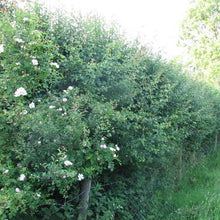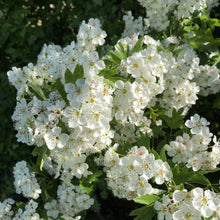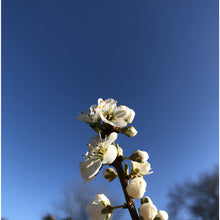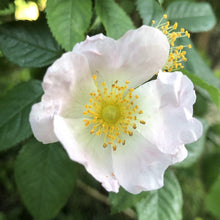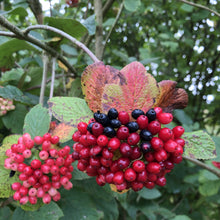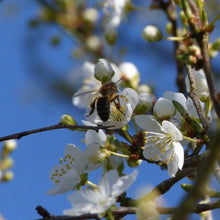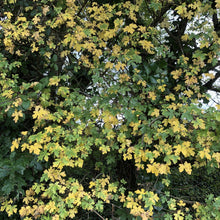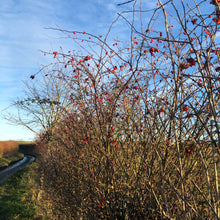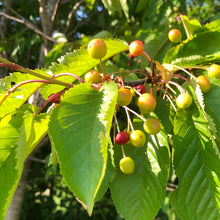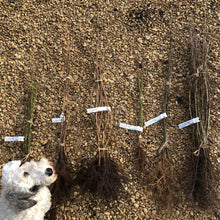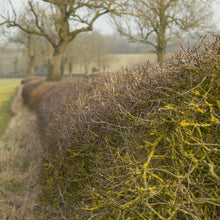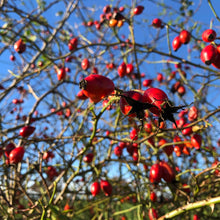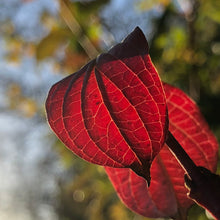
Hedge Plants: Conservation Hedge
This native British hedge plant mix will produce a traditional mixed country hedge, great for wildlife. A recent study found a whopping 2070 species in a typical 85m stretch of mixed native hedge. The photo shows a mature example, around 2m high. It makes a good people and stock proof barrier.
Each hedge pack consists of 50 plants - enough for 10m in a double staggered row. We also offer a "stock friendly" option, which is also more appropriate for gardens as it does not include suckering Blackthorn.
For the 2023/4 season we are offering a cell grown and "standard" option of our conservation mix. The cell grown plants are 20-60cm and the 2 year old hedge plants in the standard option are grading mostly as 60-90cm. These are ideal for grant funded planting. Grown in the Welsh borders, Kent and Northumberland.
Both sized mixes are selected from at least 5 species (see below) to give the hedge gives all year round interest. There will be flowers in the spring and summer, autumn colour, and fruit, nuts and berries in the autumn and winter. Our hedging is all British grown from seed harvested here and our hedge mixes have great species diversity. You'll find cheaper options elsewhere which include more (cheap) hawthorn, and plants grown overseas. Your hedge should reach around head high in 3 years, depending on conditions.
Value For Wildlife
Managed sympathetically you will create a thick hedge which will be a real boon for a range of wildlife, including small mammals, birds, bees and other insects. Not only do native hedges give wildlife a safe habitat and food all year round, they also act as safe corridors for movement. Oh, and of course we can use the fruit and nuts which this conservation hedge mix will produce too.
Good For Security, Privacy And The Environment
Traditional hedges aren't just pretty. They kept livestock in fields for hundreds of years before barbed wire, and do just as good a job keeping people out. They're excellent security hedges, including dense spiky species. The impenetrable barrier they form also make a very good privacy hedge. Many of the species here are fast growing too - any mix like this one based on Hawthorn (synonym "Quickthorn") will establish very fast. It turns out too that mixed hedges like this are really good at reducing particulate pollution in cities. They can help with flood control too, particularly in urban situations. They're a stupidly overlooked carbon sink too.
What's In The Hedge Mix?
Like many hedges across the UK, the premium and standard conservation hedge mix options are based on Hawthorn (Crataegus monogyna), giving structure, spikeyness (is that a word?), speed of establishment, and high value for wildlife. The Hawthorn makes up 50% of the mix, and the other 50% is 5 other mixed native species (more for multiple packs). We chose from these species, according to availability: Crab apple (Malus sylvestris), Blackthorn (Prunus spinosa), Dog rose (Rosa canina), Field Maple (acer campestre), Hazel (Corylus avellana), Cherry plum (Prunus cerasifera), Wild cherry (Prunus avium), Guelder rose (Viburnum opulus), Common dogwood (Cornus sanguinea), Wild privet (Ligustrum vulgare) and Common Buckthorn (Alnus frangula). These are plants which will establish well in a wide variety of conditions including shade, are widely distributed across the UK, and traditionally found in hedgerows. If you have horses and they will be able to graze the hedge when it is established, you might prefer our stock friendly hedging, which is also made up of native British hedging plants. Please note this is not available in the cell grown size.
This mix also has only 50% Hawthorn, unlike many you can buy, which include higher %s of this relatively cheap plant and less of the other stuff. If you wanted a higher proportion please ask.
How Do I plant My Hedge?
To make a stockproof hedge, whips are usually planted at 5 plants per metre in a staggered double row, or 7 plants in a triple row. Weirdly, DEFRA are currently requiring 6 plants a metre in a double row for grant aided schemes. Plant each species in a small group of 3-5 plants, and each row 50cm or so apart. We sell our conservation hedge whips in packs of 50 plants, so enough for 10m of hedge (with discounts for larger numbers). You might want to plant a wider, less dense hedge, which would not be stock proof but helpful for wildlife. In which case plant the rows up to 1m apart. Please look at our blog for help on establishment and maintenance.
Our Bare Root Hedge Plants
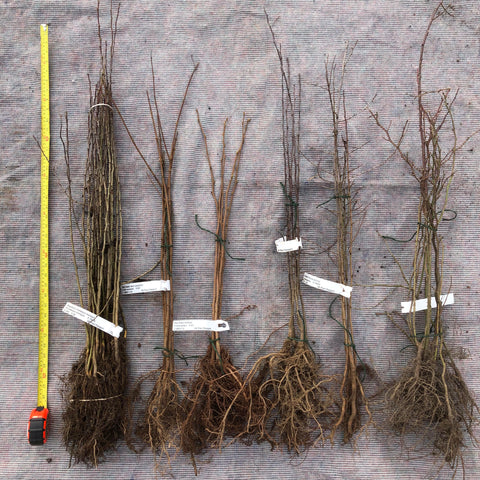 Our 50 plant bare root hedge pack will look something like this - for reference the tape is showing 1m:
Our 50 plant bare root hedge pack will look something like this - for reference the tape is showing 1m:
These hedge whips are bare root so available for delivery from November until the end of March. Like all our native hedging, they are British grown from British stock - in other words they have UK provenance and origin. All our hedge plant suppliers are members of the gold standard Plant Healthy Scheme.
Cell Grown Hedge Plants

We are also offering a cell grown hedge mix this year. These are like jumbo plug plants. They're smaller, 20-60cm, but have several advantages:
- Super-easy to plant
- Well established root system
- Easy to store ahead of planting
- Extended planting season
We may also include some pot grown plants too. They're all hardy plants, grown in Northumberland.
By the way, if you're planting a mixed hedge, why not add Holly or our native Honeysuckle to it?
Dispatch
During the lifting season there may be up to a four week delay between placing the order and dispatch, due to weather conditions or pressure of orders, which are dealt with in date sequence. Orders for bareroot hedging plants placed between end March and September are confirmed for dispatch from November.
Please looks at our tips for planting and initial care of hedge whips. We recommend Rootgrow for speedy establishment.
We offer a nationwide hedge planting service for larger projects; please get in touch for a quote.
Conservation hedge suppliers: Oakover Nurseries, RJ Trees and Hedging, Cheviot Trees
Recommended Products
-
Weed Suppression Fabric
![Biodegradable mulch mat]()
- Regular price
- £2.50
- Regular price
-
- Sale price
- £2.50
- Unit price
- per
- Availability
- Sold out
-
Bio Hedge Plant Guards and Canes
![Bioguards for hedge plants]()
- Regular price
- £2.25
- Regular price
-
- Sale price
- £2.25
- Unit price
- per
- Availability
- Sold out
-
Holly (Ilex aquifolium)
![Holly berries]()
- Regular price
- £35.00
- Regular price
-
- Sale price
- £35.00
- Unit price
- per
- Availability
- Sold out














